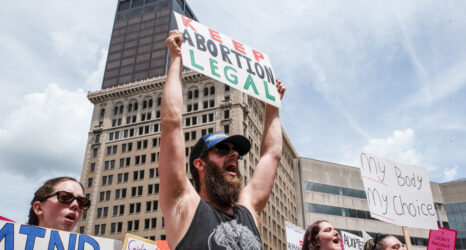The election denial scheme at the heart of the Trump indictment is continuing to wreak havoc ahead of 2024.

This article was originally published by the Brennan Center.
For the first time, a former president is facing criminal charges for a wide-ranging conspiracy to thwart American democracy. In painstaking detail, the indictment recounts Trump’s scheme “to overturn the legitimate results of the 2020 presidential election by using knowingly false claims of election fraud.” Regardless of how the case proceeds, one thing is already clear: the attacks on our democracy did not end on January 6, 2021.
The plot to overturn the 2020 election has spawned an ongoing election denial movement that is undermining voting rights, weakening our electoral system and making it more vulnerable to future attacks. This plan not only builds off the playbook used by Trump and his coconspirators in 2020, but also invokes the same lies about voter fraud and a “stolen” 2020 election detailed in the indictment. Although these thoroughly discredited lies continue to unravel as more and more of their purveyors face accountability, the damage being done in their name is far from over.
Perhaps most jarring are the attacks on election officials and election workers. Since 2020, false claims of voter fraud and election “irregularities” have prompted widespread harassment and threats of violence against election officials and their families. For example, violent threats forced one top local election official in Arizona’s Maricopa County into hiding to protect his safety and that of his family while he presided over the 2022 vote count.
His experience was not anomalous. A Brennan Center survey of local election officials in March showed that nearly one in three have faced harassment, abuse, or threats for simply doing their jobs. Forty-five percent expressed concern for the physical safety of their colleagues in future elections, and one in five reported that they personally feared being physically assaulted on the job.
Predictably, this fear has contributed to an exodus among experienced election officials. Across the country, and particularly in battleground states, turnover has rapidly increased. At least one in five said they plan to leave by 2024. In North Carolina alone, turnover has forced at least 40 of the state’s 100 counties to replace their head election official.
Alarmingly, in some instances the people replacing these professionals are election deniers themselves. This amplifies another threat to the stability of our elections: internal attacks on the security of our election administration structure. Following the 2020 election, these “insider threats” included at least 17 incidents in which election deniers seeking to uncover fraud got or tried to get unauthorized access to voting equipment and data. For example, Tina Peters, the former clerk of Mesa County, Colorado, is awaiting trial on criminal charges for her role in facilitating a security breach of the county’s Dominion voting machines. As a result, the state announced that the county’s voting equipment would have to be decertified and entirely replaced before the next election.
Election deniers are also weakening our electoral system by strategically undermining voting rights. This tactic is straight out of the Trump campaign’s 2020 playbook, described succinctly by the indictment as an effort to “discount … legitimate votes and subvert … the election result.” Since 2020, at least 28 states have passed 65 laws making it harder to vote. And these efforts show no sign of slowing down. Already in 2023, at least 11 states have enacted restrictive voting laws.
Regardless of their impact on election outcomes, these new laws cause significant, measurable harm by preventing hundreds of thousands of eligible voters from participating in elections and disproportionately targeting voters of color. Not surprisingly, the turnout gap between white and Black voters is now the largest in any presidential or midterm election since at least 2000.
Election deniers have also generated a new threat to free and fair elections: election subversion legislation that enables partisan actors to meddle in election administration. Most troubling are bills that would empower state legislators or their partisan allies to overturn election results—bills that thankfully have not yet passed. But bills that have been enacted are also problematic, including laws that give partisan actors direct control over election administrators or election administration decisions. Since the Brennan Center first started tracking these laws in 2021, at least 28 have passed.
Undoubtedly, Trump’s indictment is a critical step in reckoning with the plot to overturn the 2020 election. But we also need to confront the ongoing antidemocratic attacks that are an outgrowth of that plot. In addition to holding perpetrators accountable, we must shore up our election system so it is less susceptible to attack. That includes passing stronger legal safeguards to protect against efforts to disenfranchise voters and subvert election results. Such protections are found in the John Lewis Voting Rights Advancement Act and the Freedom to Vote Act, which was recently reintroduced in Congress, and similar bills in the states. It also includes robust judicial enforcement of the laws that are currently on the books. Our democracy is still on the line.
Read more:
U.S. democracy is at a dangerous inflection point—from the demise of abortion rights, to a lack of pay equity and parental leave, to skyrocketing maternal mortality, and attacks on trans health. Left unchecked, these crises will lead to wider gaps in political participation and representation. For 50 years, Ms. has been forging feminist journalism—reporting, rebelling and truth-telling from the front-lines, championing the Equal Rights Amendment, and centering the stories of those most impacted. With all that’s at stake for equality, we are redoubling our commitment for the next 50 years. In turn, we need your help, Support Ms. today with a donation—any amount that is meaningful to you. For as little as $5 each month, you’ll receive the print magazine along with our e-newsletters, action alerts, and invitations to Ms. Studios events and podcasts. We are grateful for your loyalty and ferocity.





